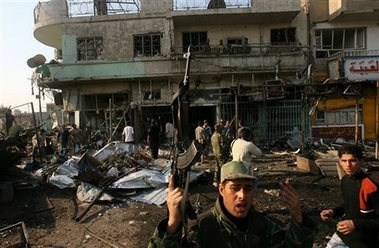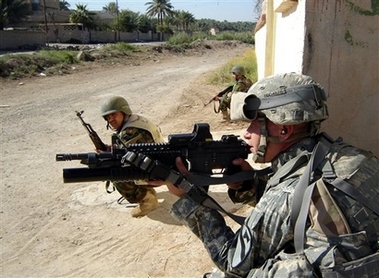US forces raid Iraq militia stronghold
(AP)Updated: 2006-11-23 15:44
"I was surprised by the heavy shooting on our minivan. I was hit badly in my left hand," said one worker, Ahmed Gatie, 24, as he was treated at Imam Ali hospital. "I can only feed my family when I work. What will happen now?"
| Special
coverage: Iraq After War |
 | |
| Related
readings: 3 Marines killed in Iraq Coalition forces conduct raid in Iraq |
 |
Three other patients were lying on hospital beds or being treated, and four bodies were bodies were lying in a morgue attached to the hospital in Sadr City, an east Baghdad grid of streets lined with tumbledown concrete block structures and vacant lots.
Witness Salah Salman, 24, said he took cover when the coalition raid began and his house came under fire.
Afterward, Salman said, he joined other local residents in helping police carry victims of the attack from the minivan to the morgue and hospital.
The raid came just weeks after Prime Minister Nouri al-Maliki, a Shi'ite, had taken on the role of protector of the sprawling Sadr City district by ordering the US military to lift a blockade of the slum.
American forces had sealed the district for several days looking for kidnapped US soldier Ahmed Qusai al-Taayie, a 41-year-old reservist from Ann Arbor, Michigan. He was visiting his Iraqi wife in Baghdad on Oct. 23 when he was handcuffed and abducted by suspected rogue gunmen from the Mahdi Army.
Al-Sadr is a major political backer of al-Maliki, who had rejected American demands to disband the heavily armed militias and their death squads that have carried out a brutal campaign of revenge attacks on Iraq's Sunni minority in a cycle of violence following the Feb. 22 bombing of a Shi'ite shrine.
But Al-Maliki has looked the other way during the most recent joint US-Iraqi raids, an about-face his aides said was prompted by anger over the US soldier's abduction and a mass kidnapping carried out by suspected Mahdi Army gunmen. Dozens of gunmen in police uniforms kidnapped scores of people during the raid on a Ministry of Higher Education office in Baghdad on Nov. 14. The ministry is predominantly Sunni Arab.
That attack was seen as another example of the revenge killings and
kidnappings among Iraq's majority Shi'ites and minority Sunnis that have left
Iraq on the brink of a sectarian civil war.
 | 1 | 2 | 3 |  |
|
||
|
||
|
|